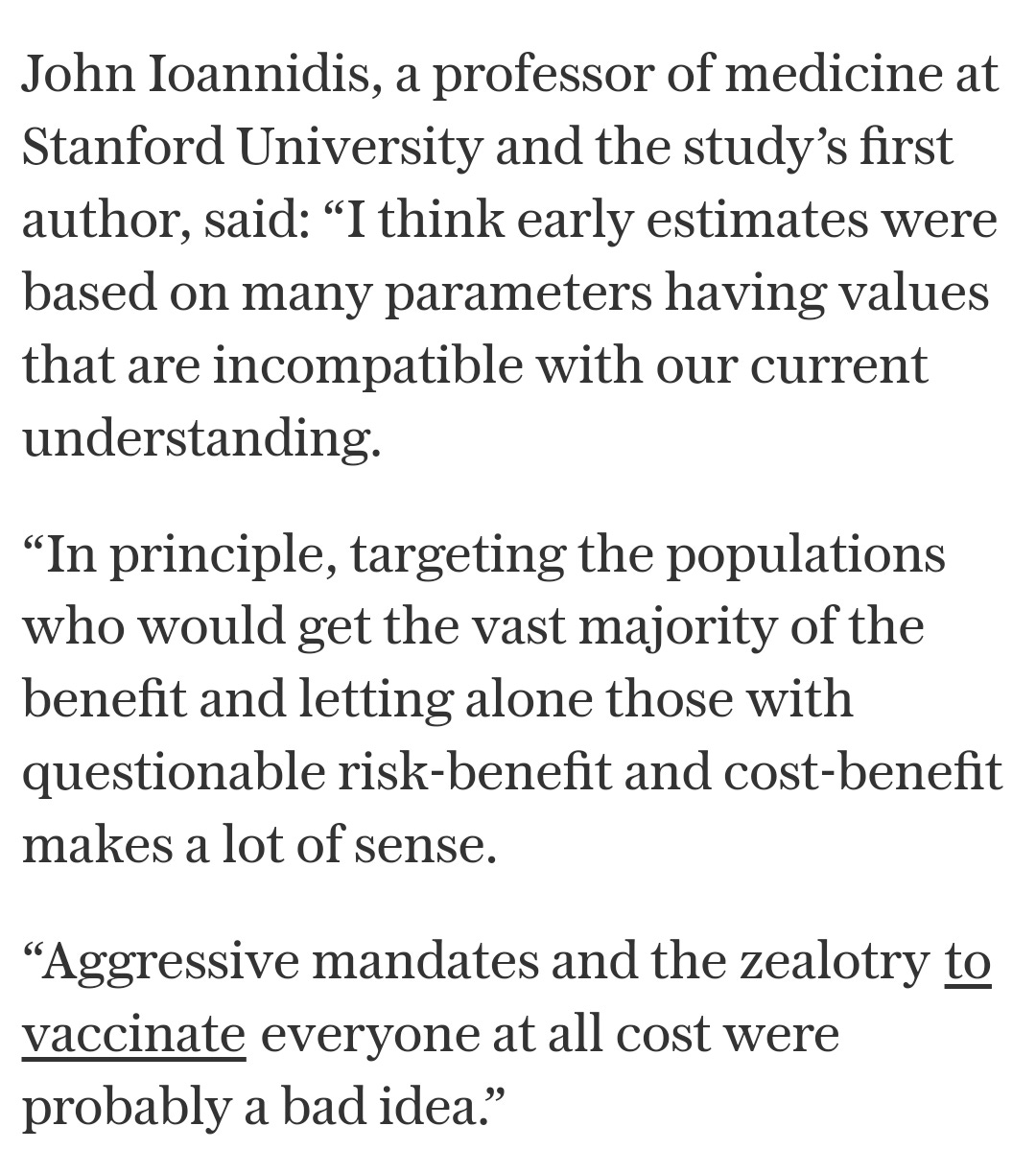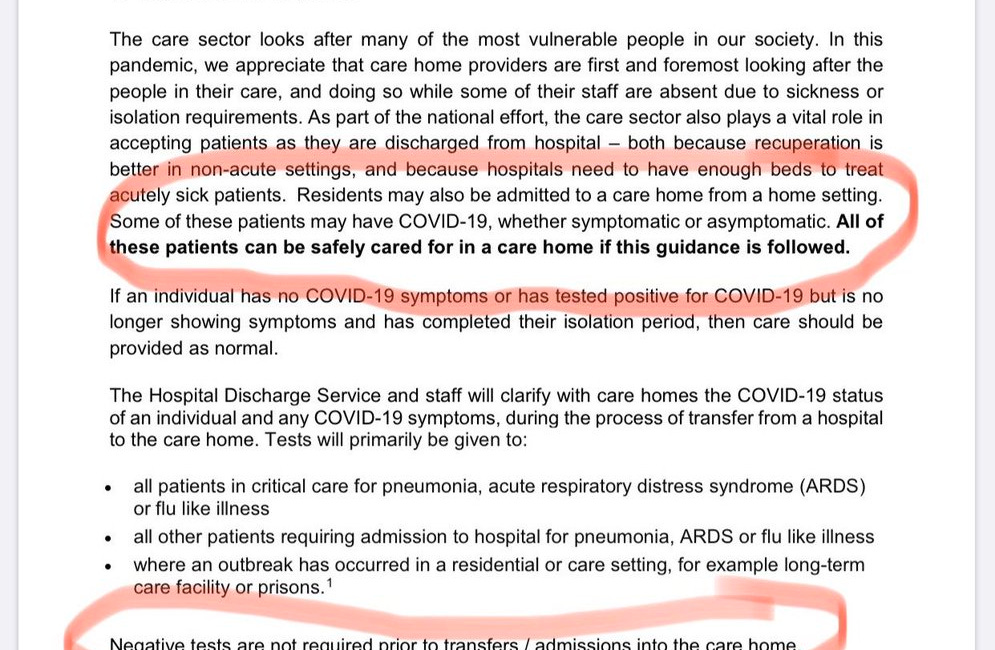Why is the Telegraph's Science Editor promoting Ioannidis' vaccine paper?
Named in the #HARTleaks, Sarah Knapton continues to only promote papers from a small coterie with a dubious track record
Last week the Telegraph ran the story that “major new analysis” had found that covid vaccines had “saved far fewer lives than first thought”, criticising figures produced by the WHO.
The claim this is “major new analysis” is more a case of the writer Sarah Knapton acting as PR for the paper's authors, upselling its value, than a true reflection of the paper.
Ioannidis has a consistent track record of downplaying the harm of covid, in March 2020 he suggested only 10,000 would die from covid in the US. In April 2020 when it was already clear his previous prediction was wildly off he upgraded to suggest less than 40,000 would die. The current figures for the US have surpassed 1,110,000 deaths.
Ioannidis was part of the group of academics which included Jay Bhattacharya and Martin Kulldorf who argued against the introduction of the first US lockdown by questioning the fatality rate, and also suggesting that a much higher proportion of the population had already been infected. Thier incredibly inaccurate predictions earned them a private audience with in the White House with Trump
The above section comes from Scott Atlas, who after being brought into the Trump administration during covid, tried to suppress data and ram through approval for Hydroxychloroquine despite there being no rigerous evidence of its effectiveness.
Bhattacharya now heads the NIH in the Trump administration, Kulldorff and Meissner are RFK Jr appointees to a vital vaccine committee, and Ladapo is Florida's controversial antivax Surgeon General.
Of all the recent papers available on covid, Knapton chose to cover this paper, continuing a trend where she only covers findings that portray vaccines in a negative light. Ioannidis latest effort is taken at face value without covering any of the criticism surrounding it, and there is considerable criticism.
Analysis by @Jean_Fisch
The paper by Ioannidis & al concluding "C19 vax saved ~1-4m" got published
As I flagged at the time of release⤵️, the paper relies on assumptions which are (often massively) too pessimistic vs the few real data points
But also its conclusions are marred by an error of logic
The conclusion on lives saved depends on the severity of Omicron vs. Delta and Wuhan. By chance, Omicron proved much less intrinsically severe than Delta ... but we couldn't know this in 2021. So the study's conclusions on the legitimacy of measures are based on hindsight.
The correct way to do this analysis would be to
- include the full range of assumptions incl. real life data, ie IFR 2-5x higher, efficacy 50%-80% higher, etc.
- make the legitimacy of actions based on the options for Omicron's potential severity AS VIEWED from mid 2021 data
I have found this issue time and time again in post-mortem analysis of Covid: The "time value" (also known as value of options) is systematically forgotten
In fact, the best people to do a post-mortem would be vega traders (so people who trade on the volatility of options)
I don't have the detail of the calculation of the Ioannidis et al study to redo their calculation "properly"
But given the impact of the changes, there is zero chance that any of its conclusions (be it on lives saved or legitimacy of measures) would stand up to scrutiny
So, in summary: This paper does not really add anything, on the contrary
- its analytical conclusions are based on pessimistic options vs. real life data
- its pandemic management conclusions are erroneous because not rooted in option-based decision-making
ADDENDUM: I think that there may be two other issues affecting the study (pushing the estimates into opposite directions though):
a) I couldn't find an estimate of lives saved from infections avoided in 2021
b) I am not sure if the vax efficacy figures are corrected for HVE
Professor Stephen Griffin. “Also, individual risk scales by prevalence. Hospitalisation rates for first two waves were astronomical. Intrinsic severity was different, but not the damp squib some make out, eg Hong Kong BA.2. Other omicrons have altered tropism.Plus, mortality is not the only outcome.”
On trend for Knapton
As Science Editor, Knapton has been in a position of great public responsibility since the emergence of covid, however her reporting has consistently shown she has both feet firmly planted in the “sceptic” camp. Knapton has prefered sources, in particular Professor Carl Heneghan who deleted his entire twitter timeline for 2020, after his predictions regarding a second wave being an artefact of PCR testing false positives proved catastrophically wrong.
Heneghan runs the Centre for Evidence Based Medicine based at Oxford University, he was responsible for publishing questionable WHO reports that concluded incorrectly that covid wasn’t airborne. In late 2020 he joined the board of Collateral Global alongside the authors of the Great Barrington Declaration, Gupta, Bhattacharya and Kulldorff. Collateral Global is funded primarily by donations from opaque trusts and foundations including the Donors Trust, which has been described as the dark money ATM for the radical right.
Collateral Global papers (which aren’t peer reviewed by a journal) have recieved coverage in the Telegraph.
When the internal chat logs of the antivax group HART were leaked, they revealed that Knapton was seen as a means to launder their disinformation into the mainstream.
Examples of Knapton's reporting:
£1.7 billion was the worse case scenario before the vaccine roll out, the real estimated figures are a fraction of this amount.
In this piece Knapton claims her scepticism has been vindicated while twisting the results of a survey of scientists.
Statistically there aren’t many.
This particular example was considered so erroneous Science.feedback.org felt the need to address the misleading claims.
https://share.google/FUDyri37jyPHWLROn
One of the worst example of Knapton's reporting was when she provided the prolific disinformation merchant and self publicist Aseem Malhotra a platform for his thoroughly debunked vaccine claims.
Malhotra used Knapton's coverage to further promote his claims, adding to his popularity with anti-vaxxers. It's this kind of coverage in mainstream newspapers that reinforces the beliefs of conspiracy theorists.
Non-Covid reporting
After the conspiracy theorist Kate Shemirani was recently accused of being responsible for the death of her daughter Paloma by persuading her not to undertake chemotherapy for cancer, supporters of Kate Shemirani were circulating and article of Knapton's from 2017.
This was a questionable and unrepeated study, which required far greater context than Knapton provided.
On Climate Change:
https://climatefeedback.org/evaluation/telegraph-article-misleads-with-false-balance-mixing-in-unsupported-and-inaccurate-claims-sarah-knapton/
Lucy Letby
Knapton also seems convinced of the innocence of Lucy Letby, a nurse who is serving 15 whole life sentences after being found guilty of murdering seven babies, and attempting to murder seven more.
Much of her recent coverage relies on reheating claims that have already been rejected.
The output of a Science Editor for a major newspaper shouldn’t be creating this much work for debunkers. Knapton's approach doesn't appear to involve any evaluation of the reliability of the papers she chooses to cover, instead she seems to choose the papers that reinforce her own biases.
Further Reading:
Internal chats reveal UK print media's role in promoting disinformation
In the US we see disinformation groups like America’s Frontline Doctors being embraced by Republican politicians, while some disinformation doctors are even running for office like Scott Jensen ( Pandata and World Doctors Alliance). This isn’t surprising considering a leaked conference call shows the shadowy Council for National Policy (CNP) was respons…
The Telegraph's "Lockdown Files"
The Telegraph's Lockdown Files are headline news across UK media, the files consist of a cache of what's app messages that former health secretary Matt Hancock handed to the writer Isabel Oakshott to speed up the completion of his Pandemic Diaries book. The Telegraph and a team of writers are now publishing some of these messages while claims are being …
Rewriting history, the politics of the "Lockdown Files"
Just as the UKs Covid Inquiry finally gets going the Telegraph has launched its Lockdown Files which has swamped the news agenda. Selective quoting spliced with sceptic “science” is being used by the Telegraph to set out the narrative that the Great Barrington Declaration was correct, that no measures worked and we should have followed a strategy of mas…





























